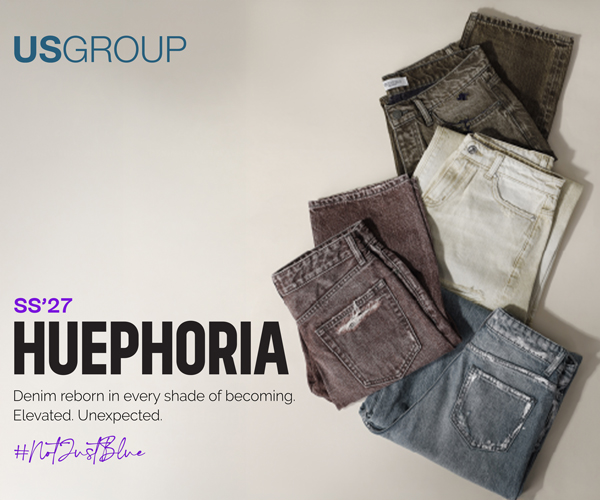Glimpse of the future

The Mills Fabrica’s London exhibition unites companies across the supply chain to promote the positive behind-the-scenes work and innovative solutions for responsible denim manufacturing.
This is a pivotal moment for denim,” says Hasan Javed, executive director at Pakistan-based mill and manufacturer AGI Denim. “As the consequences of climate change become increasingly evident and consumers seek eco-conscious choices, we are excited to present our vision for responsible denim manufacturing." AGI is one of 18 companies exhibiting at The Mills Fabrica’s new London exhibition, Denim Futures – a chance for the UK-based fashion sector, students and the wider public to witness some of the groundbreaking work that is going on across the supply chain.
The Mills Fabrica originated from Hong Kong in 2018, when parent company Nan Fung Group transformed its former cotton mills into a destination for “heritage and innovation”. The group was founded in 1954 as a yarn spinner, before diversifying into real estate and investments. The Mills Fabrica, which describes itself as a “solutions platform for accelerating techstyle and agrifood tech innovations”, expanded into London in 2021, recognising it as home to “talented individuals with a forward-thinking mindset”.
AGI introduced UK-based cotton consultancy WizCot to the exhibition, having worked together for a few years. WizCot founder Ben Eaves linked AGI with Good Earth Cotton – another exhibitor – which uses “climate positive” growing techniques and tracking technology FibreTrace to verify its products. “Under the ever-increasing regulations, this sort of supply chain should be highly desirable for retailers and brands,” Mr Eaves tells us. “It is such a great success story, and it really demonstrates the role we can play in connecting supply chains.”
The main strands of WizCot’s business involve sourcing and marketing cotton; and advising on the price direction of raw cotton by tracking the ICE NY Futures. Mr Eaves believes the future of cotton sourcing will hinge on sustainable growing, circularity and traceability, and demonstrates this through his display at the exhibition. “I expect sourcing to move towards sustainably certifiable and traceable cotton, but several roadblocks need to be addressed before it can reach scale and this must come from the top down. Regulation will be the driving force,” he adds.
Innovation library
The companies exhibiting in the Kings Cross space include other familiar names in the denim supply chain: Italian chemicals company Officina39, textile-to-textile recycling technology developer Renewcell and Tencel producer Lenzing. Others that might not be so familiar include pineapple leaf fibres supplier Nextevo, which offers blended yarns for denim. For Lenzing, Denim Futures represents an alternative way to reach the brands. “Due to travel and time restrictions, not everybody can attend the trade fairs so this kind of ‘innovation library’ helps us to convey our message,” Lenzing’s head of business development for denim, Tuncay Kiliçkan, tells us. “They are located in a great spot, so anyone who wants to go through the recent developments on the raw material side can easily show up and have an idea.”
UK-based Xeros is showcasing its XFN1 technology, which uses reusable polymer spheres called XOrbs to wash and finish denim. The company claims that by replacing pumice, the XOrbs reduce costs and lower the environmental impact. However, partners are needed to promote and scale. “We are fully alive to the fact that adopting new technologies can be challenging for brands and manufacturers, so having partners that showcase the potential benefits is a vital step in this journey of adoption and commercialisation,” says Emily Axten, Xeros’ marketing director.
For Amy Tsang, The Mills Fabrica’s acting head for Europe, one of the most important processes that needs addressing by the denim industry is dyeing, which is why Nature Coatings, with its carbon black alternative made rom wood waste, and Huue, a maker of bio-based indigo dye, are part of the exhibition. “Another big topic is the amount of virgin polyester that is used to make garments, that ultimately ends up in landfill,” she adds. “Circ is solving this issue with its technology to recover and recycle polyester and cotton from textile waste, especially polycotton blends, which can then be used to make new clothes.”
On the finished product and retail side, the partners are mycelium producer Evocative, sketchbook maker Fashionary, and upcyclers Alexandra Armata and Beyond Remade. ‘Biodesigner’ Zena Holloways shows how roots are her inspiration, Sparxell makes glitter from bio sources and WNWN creates chocolate without cocoa.
“Although a lot more needs to be done, there are many incredible innovations out there that contribute to reducing the negative impact of denim production on the environment,” adds Ms Tsang. “The exhibition provides a platform for these brands, innovators and manufacturers to showcase their solutions to not only the industry but the everyday consumer, in the hope of inspiring and educating.”
Denim Futures runs until March 31 at Fabrica X, 36-40 York Way, Kings Cross, London N1 9AB. 9am-6pm weekdays.
Retailers, brands, journalists and the public delve into the science behind the style.
All photos: The Mills Fabrica













